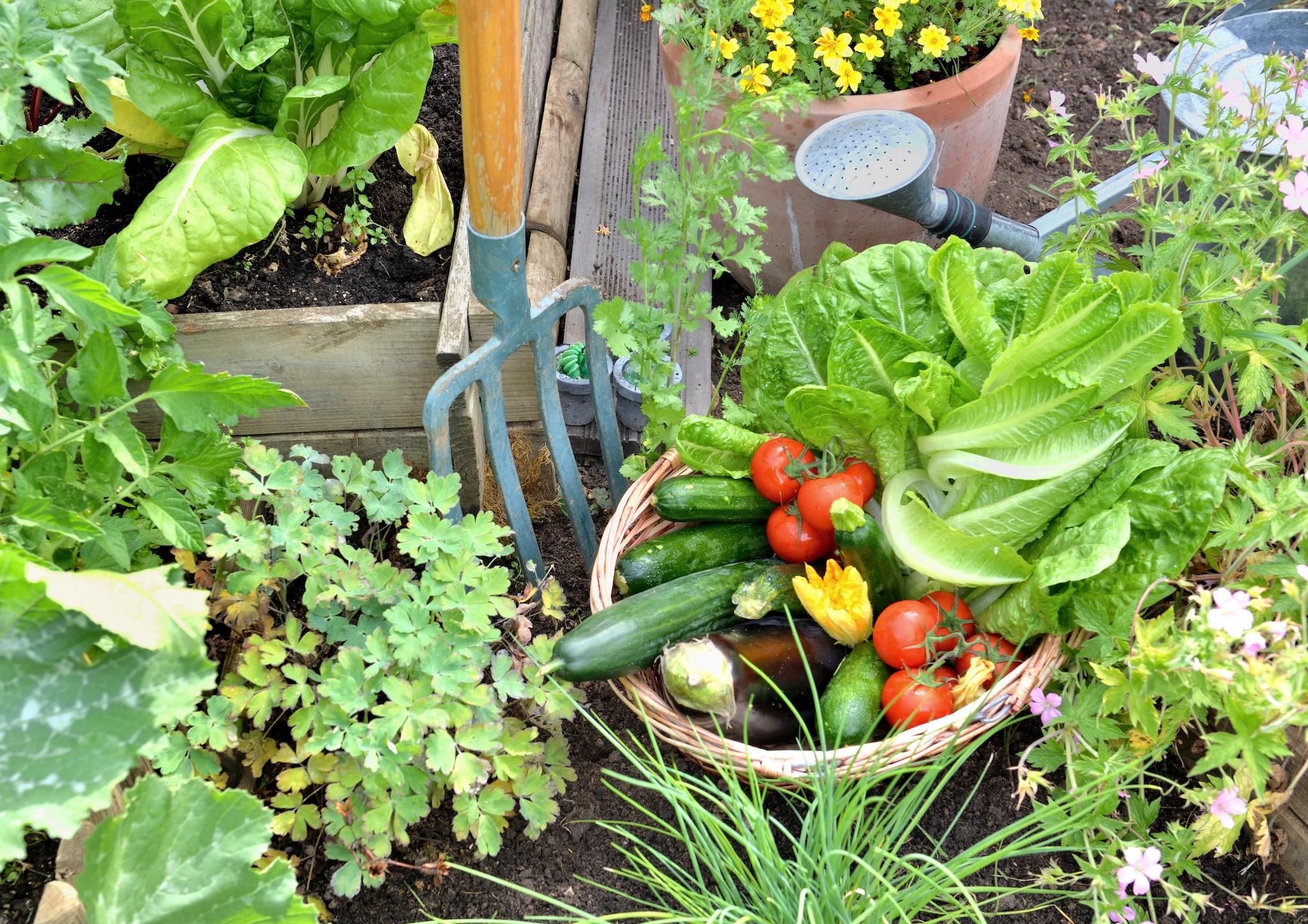Maintaining Your Vegetable Garden
If you're new to gardening, it can seem very overwhelming when you realize how much work there is to do to keep everything maintained and thriving throughout the growing season. Learn how to keep your vegetable plants strong, disease-free, and keep those garden critters out of your precious plants.

The danger of frost has passed; you have properly amended your soil and lovingly planted your seeds and transplants. Congratulations! Now, it's time to ensure that you have a successful and bountiful harvest. Here are some tips for maintaining your garden.
Thinning seedlings
After sowing the seeds, sprouts should be thinned so they have room to spread out and grow. Do this soon after they sprout and continue to thin as the plants get larger.
Water regularly
The best time to water is early in the day. In very warm weather, most of the water evaporates when irrigation occurs during the midday hours. Also, watering early keeps the plants dry when night falls, which makes plants less prone to disease. Vegetables should get about an inch of water each week. If weekly rainfall in less than 1 inch, you need to supplement lack of rain and water by hand. A single, deep watering is preferred to short, frequent spurts.
Mulch and weed control
Applying mulch helps control weeds by blocking light from their seeds. At least 4 inches of organic material such as leaves, straw, compost or grass clippings can be applied to keep the light out. Make sure the material is free of chemicals such as herbicides. Tomatoes especially benefit from mulching because it tends to keep the fruit off the ground and controls moisture loss around the plant. Black plastic mulch is very efficient for weed control, but be sure to remove it at the end of the season, because it will not decompose like natural mulches. However, water will not penetrate or evaporate through plastic, so it is best used for rows, and placed a little bit away from your plants.
Weeds can sap vital nutrients away from your soil. It is important to keep ahead of them before they become a problem. Persistence is key, and early control and removal is essential. Weeds are the easiest to get rid of before they go to seed. Hand-pull or use a hoe or cultivator to remove weeds.
Fertilize
High levels of organic material in the garden are beneficial to vegetable growth. Compost, which is rich in organic matter and helpful microorganisms, adds some much-needed nutrient content to the soil. Adding a fertilizer specifically for vegetables will guarantee your plants receive the nutrients they require. Organic fertilizers add basic nutrients, increase microorganism activity and are a great option for the environmentally conscious.
Control insects
Fleet Farm offers a spray that’s safe for vegetables and listed for use in organic gardens. Other means of control include hand removal of the offending pests, or covering problem areas with floating row covers. Proper identification of the insects is essential, as many garden insects are actually beneficial. Common pests include maggots (on broccoli, cabbage), beetles (vine crops, tomatoes and eggplants), worms (cabbage, squash, tomato and sweet corn), and slugs. Slugs and snails feed at night and love wet conditions. Keeping plants staked and off the ground helps remove hiding places. Your local county extension office can help you identify the pests in your garden and suggest methods of control. For more information about what’s available in your area, click on your on state the map at the US Department of Agriculture website.
Disease control
Plants that are not stressed do a better job of resisting disease. A balanced supply of nutrients (see Fertilize, above) will insure vigorous plants. Adequate air circulation (avoiding overcrowding) is also a great tip for discouraging the spread of disease. Remove any diseased plant matter (stalks, leaves, or roots) immediately to prevent spreading, and DO NOT put diseased matter in your compost pile. Place it in your trash. Tomatoes are susceptible to blight and may need to be treated with a fungicide, especially if the growing season is cool and wet. Choose one that is safe for use on vegetables. Be sure to follow label directions carefully. Another common tomato malady is blossom-end rot. Constant watering during the plant’s first 6 weeks of growth will allow the plant to absorb the calcium needed to prevent this disease. It is important to do a thorough clean-up of your garden in the fall. Get rid of all the diseased matter and turn the soil.
Control birds, rabbits & other mammals
Some animals love to share the fruits of YOUR labor. Birds can be discouraged from frequenting your garden by using shiny aluminum discs, such as pie plates, tied to a stake. The noise and the flashing light deters them. Commercial netting may be used to keep the birds out of berry patches.
Rabbits can be kept out with a fence of 1-inch chicken wire, about two feet high. Bury the bottom of the wire underground to keep them from burrowing into your garden. Deer can be kept out with a high fence, or try using a liquid repellent. Be sure to follow the directions in regard to contact with your garden.
Provide support
Tomato plants will benefit from support cages or staking. This helps keep the fruit off the ground, protects the growing fruit and prevents wind damage. Vine-growing vegetables such as cucumbers and squash can be supported with a mesh garden trellis. Allowing them to grow vertically makes them easier to harvest, too. A teepee formed of tall stakes allows pole beans to grow tall and supported.
Start a garden diary
Keep a record of your garden’s progress. You can make note of what vegetables you’d like to try again, or those you want to avoid. Keeping track of your garden’s growth will be a helpful resource for future reference.












